Army Ranger Veteran Rolls With the Punches on Pan-American Bicycle Trip
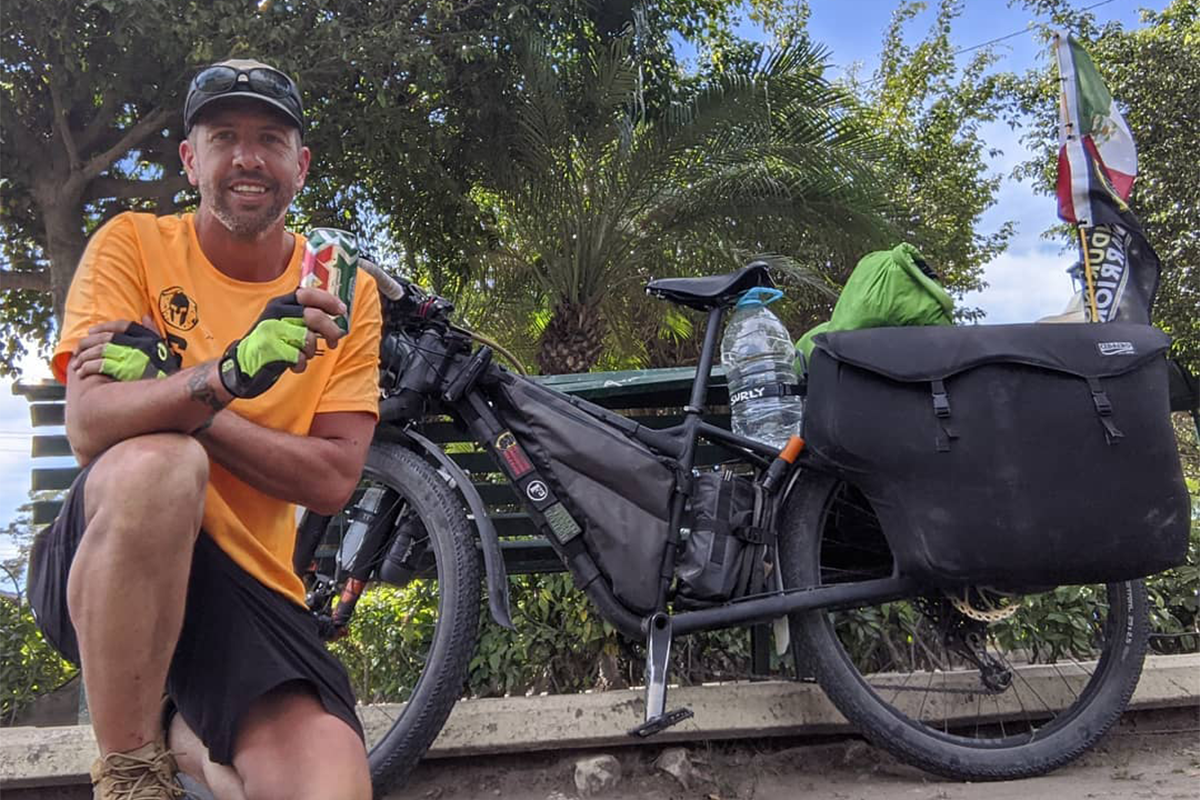
Daniel Stokes set out on an 18,000-mile Pan-American highway bicycle ride, his most epic challenge yet, in September 2019. But his journey has been repeatedly halted by pandemic-related border closures. Photo courtesy of Daniel Stokes.
The 550 miles of highway across Canada’s Yukon territory were quiet, except for the air whistling through the spokes of Daniel Stokes’ wheels, the crunch of his tires on the snow, and, somewhere in the dark, a chorus of wolves.
Stokes had never known he was afraid of wolves until that moment. Exposed, unarmed, and with upwards of 50 miles left to pedal before hitting the next town, he would have made easy prey.
So he prayed they wouldn’t eat him for dinner. He lucked out that night. And the next. And the next. But the howls never stopped sending a chill through him.
Stokes set out on an 18,000-mile Pan-American highway bicycle ride in September of 2019. The retired Army Ranger expected the adventure to take a year and a half. But epic adventures don’t always keep to a schedule.
The first time Coffee or Die Magazine spoke with Stokes was in January 2022 while he was at a hotel in Mollendo, Peru, 47 miles from the Chilean border. Chile had recently re-closed its northern border as the coronavirus pandemic neared a third year. As a result, Stokes was plotting an alternate route to Argentina, a twisting road that would take him from sea level to the height of the Andes Mountain Range and through Bolivia, adding hundreds of extra miles to his ride. But he was also hearing that Bolivia had just closed its border, with no set opening date.
The next day, it became clear he’d have to put his journey on hold and return to Tacoma. Again.
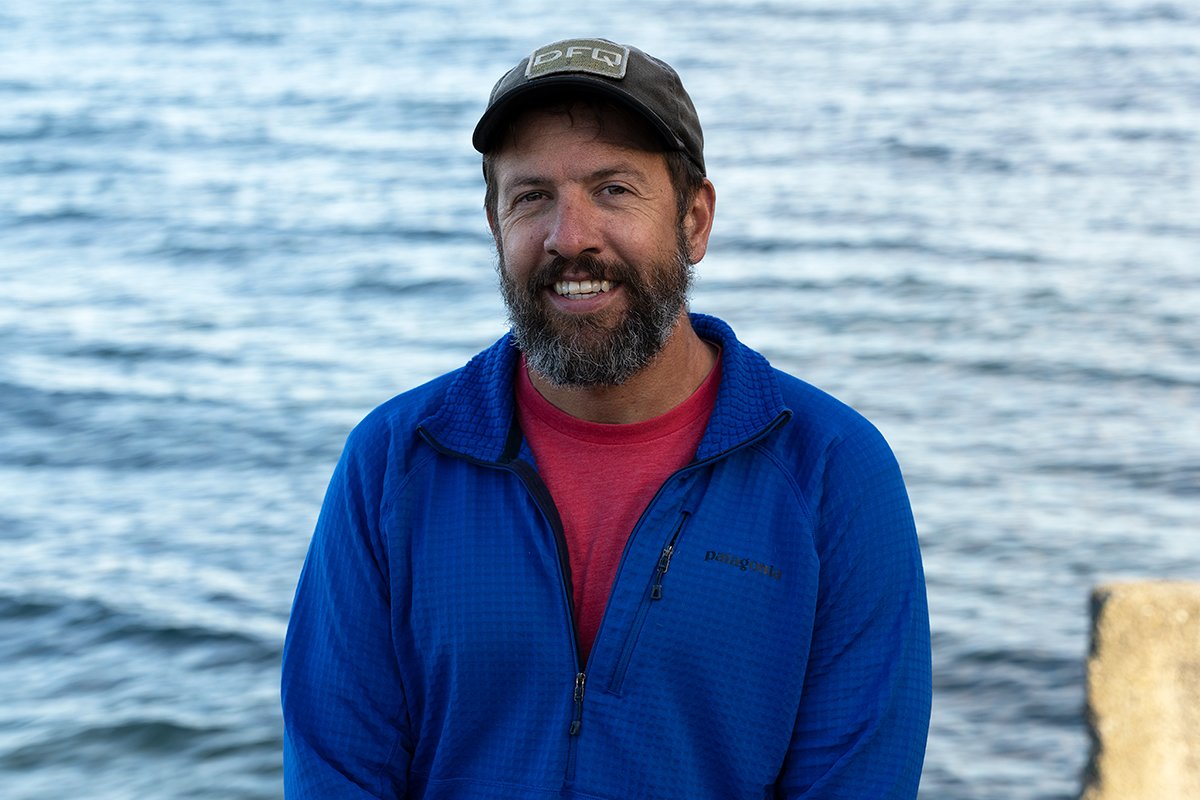
A couple weeks later, we speak again, this time in person, with his oldest son, Noah, 27. Noah had accompanied Stokes for the first 500 miles of his journey, but they are seeing each other for the first time in months, catching up over mochas and breakfast croissants at a coffee shop in Bellingham, Washington, where Noah lives.
“[Dad’s] bike tour gives me a perspective, like you can accomplish anything you set your mind to, even with the whole world throwing you setbacks,” Noah said. “You gotta fight for it tooth and nail sometimes, but it’s still happening.”
Stokes spent more than two decades in the Army, first as an armor crewman and finally as a signal officer with the 75th Ranger Regiment. He retired in 2015 and immediately poured himself into volunteer work.
“I figured I needed to just take some ‘me time,’ just for my own mental wellness,” he said. “Sort of like a decompression stop from leaving the Army and not really processing everything I went through in the military.”
The best way to achieve that would be through an epic challenge — his own version of World War II veteran Earl Shaffer’s attempt to “walk off the war” by becoming the first person to hike the entire Appalachian Trail. A competitor at heart, Stokes already had a goal each year to do something bigger than the year before. In 2018, he rucked 1,000 miles.
“So I figured, well, let me give my feet a break and do something on my wheels instead,” he said.
Stokes wandered over to a globe, similar to the kind you’d see in an elementary school classroom, and gave it a lazy spin, eyes scanning the colorful continents. He glanced at the farthest north point one can go by roads in North America — Prudhoe Bay, Alaska. Then his eyes traveled down, down, down to where the roads ended in South America at a town called Ushuaia, Argentina.
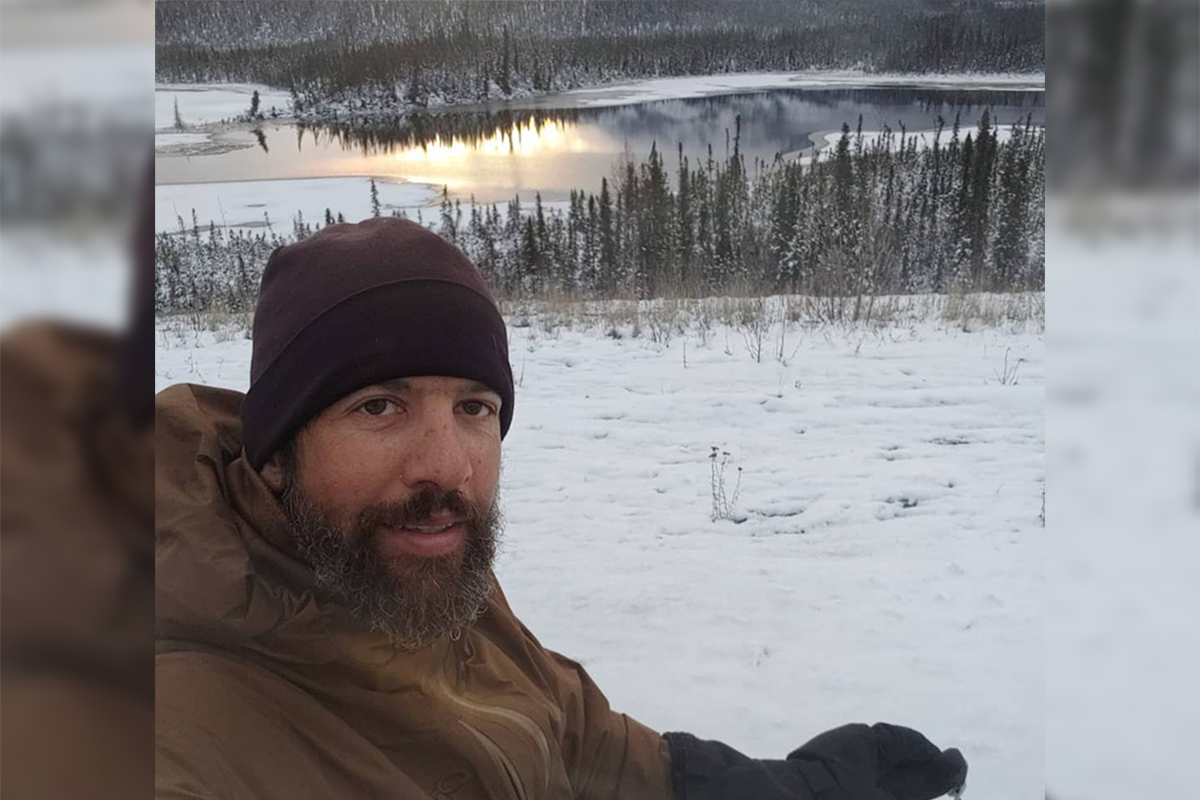
Stokes didn’t know at the time about the Pan-American Highway, an approximately 18,000-mile route popular among adventurous motorists, bikers, cyclists, and even a couple ambitious hikers, including another former Ranger, Holly “Cargo” Harrison.
Stokes and Noah landed in Prudhoe Bay on Sept. 26, 2019. The city, essentially just a logistics space for the United States’ largest oil field, reminded Stokes of a deployment zone. They took their bikes to the hotel, did a test ride the next morning, and then set off.
“Literally every local we passed was just like, ‘You guys are a month late,’” Noah recalled.
Of Stokes’ four children, Noah appears to go on the most adventures with his dad, summiting Humphreys Peak — the highest point in Arizona — and participating in countless GoRuck challenges over the years. He maintains a similar level of optimism to that of his dad, even in the face of unforgiving Alaskan weather.
At one point, their tires cut through muddy roads the consistency of peanut butter. They were rolling heavy with all their food, fuel, and water not yet depleted by weeks of travel. Noah’s wheel filled with the gunk and he had to pause, using sticks to poke the mud out.
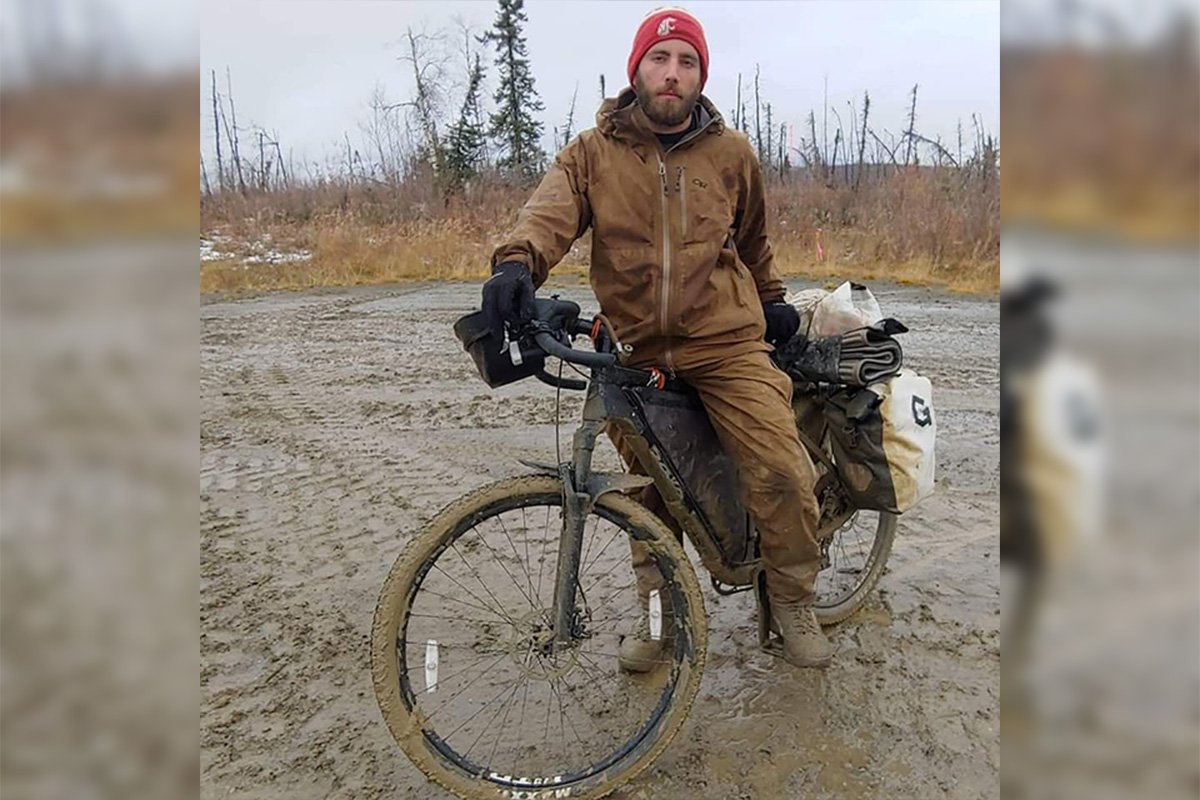
While riding through a blizzard in Anaktuvuk Pass, Stokes ran out of traction and had to push his bike. He would take two steps forward, then slide back down the road.
One morning, when they woke up, ice had crystalized the inside of the tent.
“That was the most difficult cycling of the whole tour so far, just because it was so cold and so remote, and so mountainous,” Stokes said. “But we’re great teammates.”
Nine days into the journey, they reached Fairbanks, and Noah headed home to get back to work, leaving Stokes to navigate the desolate, lonely, wolf-inhabited Yukon Territory on his own. Many nights were so cold that he just continued riding so he could produce body heat, eating packets of instant coffee dry to stay awake. At least once, he fell asleep at the handlebars and went off the road, very nearly tumbling down an embankment.
For six months he pedaled through North America, traversing upwards of 100 miles on a good day. Piled onto his bicycle were all the clothes he could need for any environment; a tent, sleeping pad, sleeping bag, cookstove, fuel, and other camping gear; some small electronics; tools and spare bicycle parts; food; and around three gallons of water, depending on the distance between towns.
He reveled in the kindness of strangers along his journey, like the men in Mexico who leaned out the passenger side of their car to offer him a fresh can of Tecate Light. The wind whipped foam at his burning face as Stokes cracked the can and tipped it back. “Salud!” he shouted as the car pulled away.

As Stokes rolled through the southern towns of Mexico, he began hearing about something called the coronavirus.
On March 15, 2020, Stokes reached Guatemala City and saw people wearing surgical masks. He had seen similar public health precautions when traveling in Asia during his years in the Army, but they felt out of place in the Americas.
Then, his wife called.
“Are you going to come home?”
“No of course not,” he replied, shocked. “I’m committed to this.”
“The president is considering closing airports in the United States,” his wife said. “If you don’t come home now, you might not be able to.”
He soon learned that Washington was shuttering bars and restaurants and banning large gatherings. Grocery store shelves sat empty. Travelers faced hours-long lines in airports around the country.
Stokes started to fear for his family. So he put his cycling trip on hold and flew home, expecting to return to Guatemala in a month or so and finish his ride.
It would be more than a year before he returned to Central America.
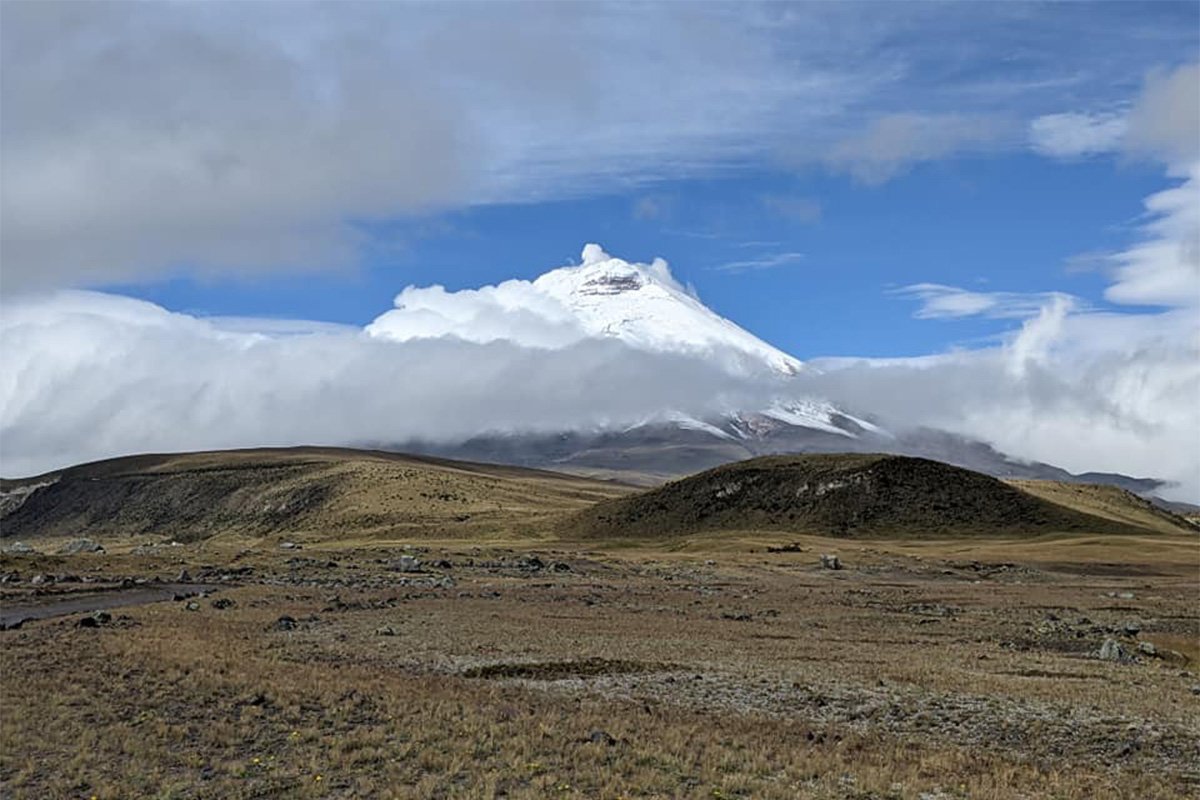
“Every interruption really exasperates the entire bicycle tour,” Stokes said, recalling the moment he restarted his trip at the same spot in Guatemala in the summer of 2021. “You lose momentum. Physically, but also while you’re going on a long distance trip, you sort of get into a rhythm of doing all these requirements, from navigating water procurement, food preparation, maintenance on the bike, all those things that you gotta do throughout the day in addition to pedaling anywhere from 12 to 14 hours.”
Stokes said he also underestimated how emotionally draining the journey would be.
“I wanted the solitude. I wanted to decompress from being around people,” he said. “But having to do all of the tasks myself and not having somebody to share decision making with or just to talk to and pass the time, that kind of drains me as well.”
The day after Christmas 2021, Stokes set out from Quito, Ecuador. He pedaled about 100 feet before three dogs darted out from an empty lot on his right side. Stokes kept pedaling, thinking they would just bark and chase after him. But one dog, a mangy, scrappy thing, started nipping at his leg.
Stokes struggled to maintain his balance as he took his right foot off the pedal and kicked at the dog, grazing its body, but not hard enough to deter the canine. As Stokes kept kicking, a second dog bit at his leg, its tooth scratching his ankle. He continued his jolty ride, trying to pedal and kick in sync, until the pack finally lost interest.
Dogs, he said, were a frequent nuisance on his rides, although they usually didn’t actually bite.
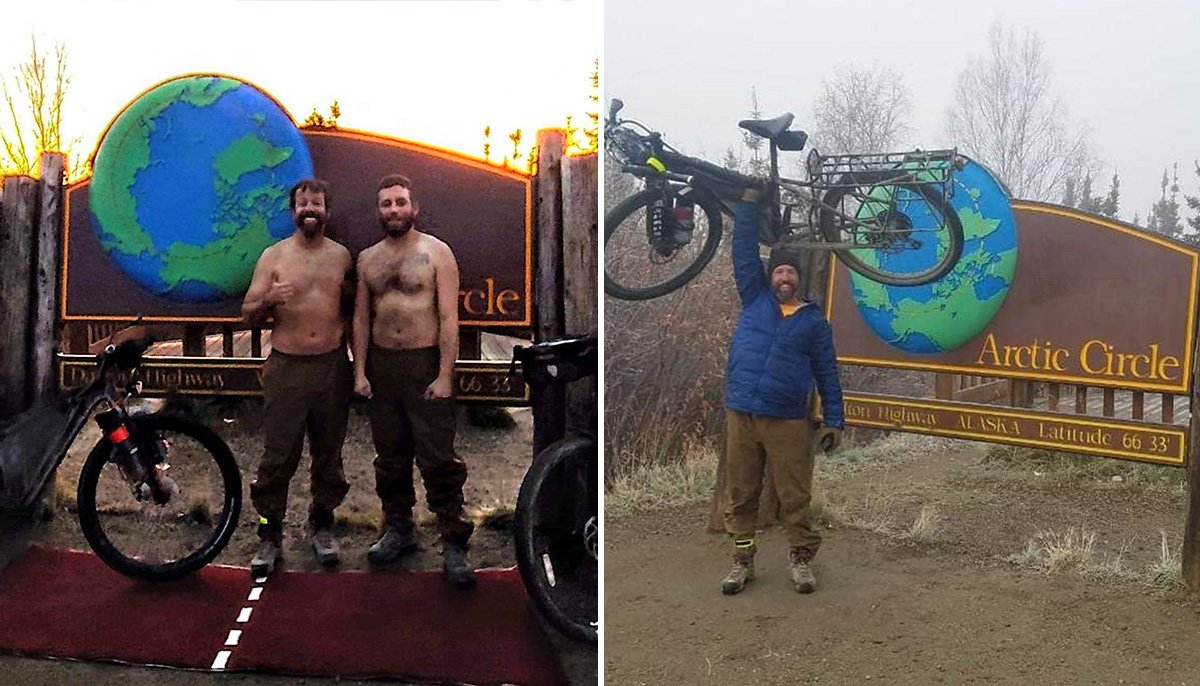
Stories about the more dangerous side to life on the road are new to Noah — Stokes generally holds back such tales until he’s safely home.
“He’s so accomplished and level-headed and always seems to know what to do in situations,” Noah said of his dad. “And he never seems to put himself into more risk than he can handle.”
Noah plans to bookend the journey with his dad, cycling from southern Chile to the tip of Argentina with him.
Stokes has a clear image in his mind of the victory photo he wants to take with Noah when they reach Ushuaia. There’s a sign in town that reads “fin del mundo” — “end of the world.” Even though it will probably be freezing cold, they’ll take their shirts off and hoist their bikes up over their heads.
“We did the same picture when we crossed the Arctic Circle in the Northern Hemisphere,” Stokes explained. “This was supposed to be the matching photo for the Southern Hemisphere.”
The timeline is once again up in the air as they wait for governmental restrictions and the seasons (South America’s winter runs from June to August) to cooperate, but Stokes is confident he’ll finish the journey, even if it’s not exactly the way he envisioned when he set out almost three years ago.
“I’ve invested so much of myself into this endeavor,” he said. “I will get there one way or the other.”
Read Next:
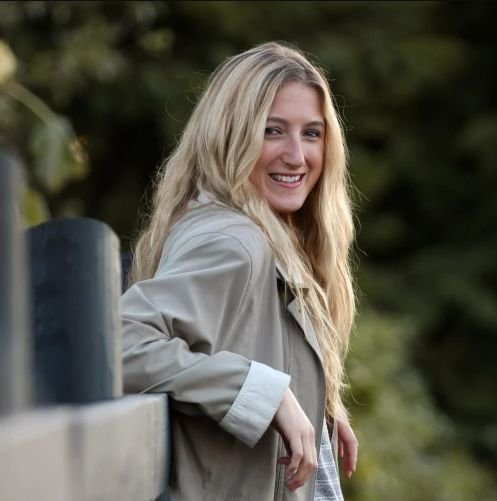
Hannah Ray Lambert is a former staff writer for Coffee or Die who previously covered everything from murder trials to high school trap shooting teams. She spent several months getting tear gassed during the 2020-2021 civil unrest in Portland, Oregon. When she’s not working, Hannah enjoys hiking, reading, and talking about authors and books on her podcast Between Lewis and Lovecraft.
BRCC and Bad Moon Print Press team up for an exclusive, limited-edition T-shirt design!
BRCC partners with Team Room Design for an exclusive T-shirt release!
Thirty Seconds Out has partnered with BRCC for an exclusive shirt design invoking the God of Winter.
Lucas O'Hara of Grizzly Forge has teamed up with BRCC for a badass, exclusive Shirt Club T-shirt design featuring his most popular knife and tiomahawk.
Coffee or Die sits down with one of the graphic designers behind Black Rifle Coffee's signature look and vibe.
Biden will award the Medal of Honor to a Vietnam War Army helicopter pilot who risked his life to save a reconnaissance team from almost certain death.
Ever wonder how much Jack Mandaville would f*ck sh*t up if he went back in time? The American Revolution didn't even see him coming.
A nearly 200-year-old West Point time capsule that at first appeared to yield little more than dust contains hidden treasure, the US Military Academy said.












